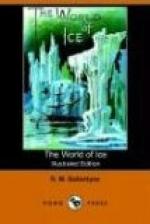“True, West. The ice, if it could speak, would explain many things that now seem to us mysterious; and yonder goes a big rock on a journey that may perhaps terminate at a thousand miles to the south of this.”
The rock referred to was a large mass that became detached from the cliffs and fell, as he spoke, with a tremendous crash upon the ice-belt, along which it rolled for fifty yards. There it would lie all winter, and in spring the mass of ice to which it was attached would probably break off and float away with it to the south, gradually melting until it allowed the rock to sink to the bottom of the sea, or depositing it, perchance, on some distant shore, where such rocks are not wont to lie—there to remain an object of speculation and wonderment to the unlearned of all future ages.
Some of the bergs close to which they passed on the journey were very fantastically formed, and many of them were more than a mile long, with clear, blue, glassy surfaces, indicating that they had been but recently thrown off from the great glacier of the North. Between two of these they drove for some time, before they found that they were going into a sort of blind alley.
“Sure the road’s gittin’ narrower,” observed O’Riley, as he glanced up at the blue walls, which rose perpendicularly to a height of sixty feet on either hand. “Have a care, Meetuck, or ye’ll jam us up, ye will.”
“’Tis a pity we left the ice-belt,” remarked Fred, “for this rough work among the bergs is bad for man and dog. How say you, Meetuck—shall we take to it again when we get through this place?”
“Faix, then, we’ll nive’r git through,” said O’Riley, pointing to the end of the chasm, where a third iceberg had entirely closed the opening.
The Esquimau pulled up, and after advancing on foot a short way to examine, returned with a rueful expression on his countenance.
“Ha! no passage, I suppose?” said Fred.
“Bad luck to ye!” cried O’Riley, “won’t ye spaak?”
“No rod—muss go bock,” replied Meetuck, turning the dogs in the direction whence they had come, and resuming his place on the sledge.
The party had to retrace their steps half-a-mile in consequence of this unfortunate interruption, and return to the level track of the ice-belt, which they had left for a time and taken to the sea-ice, in order to avoid the sinuosities of the land. To add to their misfortunes, the dogs began to flag, so that they were obliged to walk behind the sledge at a slow pace, and snow began to fall heavily. But they pressed forward manfully, and having regained the shore-ice, continued to make their way northward towards the ship, which was now spoken of by the endearing name of home.
CHAPTER XIV.
Departure of the sun—Effects of darkness on dogs—Winter arrangements in the interior of the “Dolphin."




